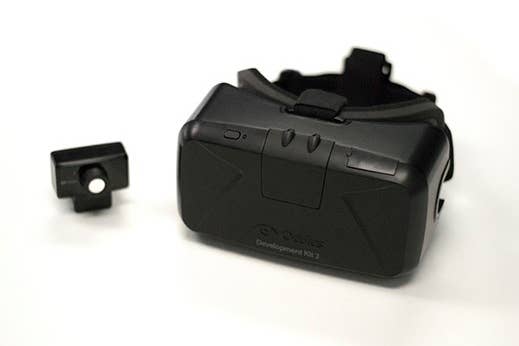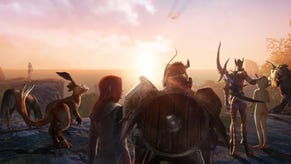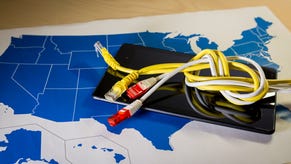Facebook acquiring Oculus for $2 billion
Social network reach agreement with VR headset maker for $400 million in cash, 23.1 million shares of stock [UPDATE: comment from Palmer Luckey]
Facebook has just placed a massive bet on virtual reality, as the social network today announced a deal to acquire Oculus VR, makers of the upcoming Rift headset, for approximately $2 billion in cash and stock, with another $300 million contingent on performance.
Under the terms of the deal, Facebook will pay $400 million of the acquisition cost in cash, with the remainder made up by 23.1 million shares of Facebook stock (which closed today's trading at $64.10).
"Mobile is the platform of today, and now we're also getting ready for the platforms of tomorrow," Facebook founder and CEO Mark Zuckerberg said in announcing the deal. "Oculus has the chance to create the most social platform ever, and change the way we work, play and communicate."
In a post on his timeline, Zuckerberg said that immersive gaming is only the first application the company has in mind for Oculus' technology. He expects that one day, augmented reality will be a fact of life for billions of people.
"After games, we're going to make Oculus a platform for many other experiences," Zuckerberg said. "Imagine enjoying a court side seat at a game, studying in a classroom of students and teachers all over the world or consulting with a doctor face-to-face -- just by putting on goggles in your home.
"This is really a new communication platform," he continued. "By feeling truly present, you can share unbounded spaces and experiences with the people in your life. Imagine sharing not just moments with your friends online, but entire experiences and adventures."
The Oculus management team released its own statement, saying, "At first glance, it might not seem obvious why Oculus is partnering with Facebook, a company focused on connecting people, investing in internet access for the world and pushing an open computing platform. But when you consider it more carefully, we're culturally aligned with a focus on innovating and hiring the best and brightest; we believe communication drives new platforms; we want to contribute to a more open, connected world; and we both see virtual reality as the next step."
They went on to say that Facebook shared their belief in VR's potential to change the world, and that the social networking giant will help make that happen.
"This partnership is one of the most important moments for virtual reality: it gives us the best shot at truly changing the world," they said. "It opens doors to new opportunities and partnerships, reduces risk on the manufacturing and work capital side, allows us to publish more made-for-VR content, and lets us focus on what we do best: solving hard engineering challenges and delivering the future of VR."
Oculus will remain in Irvine, California and continue development on the Rift. The company has already received orders for more than 75,000 dev kits of the forthcoming VR headset.
The acquisition is expected to close in the second quarter of the year. As for the Oculus Rift, it still has not been given a launch window.
[UPDATE] In a post on Reddit, Oculus founder Palmer Luckey shared his thoughts on what the Facebook acquisition means for his company and VR going forward:
"I've always loved games. They're windows into worlds that let us travel somewhere fantastic. My foray into virtual reality was driven by a desire to enhance my gaming experience; to make my rig more than just a window to these worlds, to actually let me step inside them. As time went on, I realized that VR technology wasn't just possible, it was almost ready to move into the mainstream. All it needed was the right push."
"We started Oculus VR with the vision of making virtual reality affordable and accessible, to allow everyone to experience the impossible. With the help of an incredible community, we've received orders for over 75,000 development kits from game developers, content creators, and artists around the world. When Facebook first approached us about partnering, I was skeptical. As I learned more about the company and its vision and spoke with Mark, the partnership not only made sense, but became the clear and obvious path to delivering virtual reality to everyone. Facebook was founded with the vision of making the world a more connected place. Virtual reality is a medium that allows us to share experiences with others in ways that were never before possible."
"Facebook is run in an open way that's aligned with Oculus' culture. Over the last decade, Mark and Facebook have been champions of open software and hardware, pushing the envelope of innovation for the entire tech industry. As Facebook has grown, they've continued to invest in efforts like with the Open Compute Project, their initiative that aims to drive innovation and reduce the cost of computing infrastructure across the industry. This is a team that's used to making bold bets on the future."
"In the end, I kept coming back to a question we always ask ourselves every day at Oculus: what's best for the future of virtual reality? Partnering with Mark and the Facebook team is a unique and powerful opportunity. The partnership accelerates our vision, allows us to execute on some of our most creative ideas and take risks that were otherwise impossible. Most importantly, it means a better Oculus Rift with fewer compromises even faster than we anticipated."
"Very little changes day-to-day at Oculus, although we'll have substantially more resources to build the right team. If you want to come work on these hard problems in computer vision, graphics, input, and audio, please apply!"
"This is a special moment for the gaming industry - Oculus' somewhat unpredictable future just became crystal clear: virtual reality is coming, and it's going to change the way we play games forever. I'm obsessed with VR. I spend every day pushing further, and every night dreaming of where we are going. Even in my wildest dreams, I never imagined we'd come so far so fast. I'm proud to be a member of this community - thank you all for carrying virtual reality and gaming forward and trusting in us to deliver. We won't let you down."
[UPDATE 2] On a Facebook investor's conference call held shortly after the news broke, Mark Zuckerberg and Oculus CEO Brendan Iribe addressed the implications of the deal and fielded a few questions. Here are some of the more notable comments from the call.
Mark Zuckerberg:
“There are now more than one billion people using our mobile apps alone... and more than half of our ad revenue comes from mobile. We still have a lot of work to do on mobile but at this point we feel strong enough in our position that strategically we also want to start focusing on building the next major computing platform that will come after mobile. The history of our industry is that every 10 or 15 years there's a new major computing platform whether it's the PC, the web or now mobile. History suggests that there will be more platforms to come and that whoever builds and defines these will not only shape all the experiences that our industry builds but also benefit financially and strategically.”
“We're going to focus on helping Oculus build out their product and develop partnerships to support more games and accelerate their plans, and they'll continue operating independently within Facebook to do this... Oculus has the potential to be the most social platform ever. We're making a long-term bet that immersive virtual and augmented reality will become a part of people's daily lives.”
“The Oculus product that they have now is way ahead of anything else out there. Sony has demoed something very early. Microsoft hasn't even gotten to the point where they have anything to demo yet... The other thing that I think is important here is in order to build a really big computing platform there are a bunch of important use cases that you need to support. So whether you're looking at mobile and how people spend their time or PCs before... what we see is that 40 percent of the time people spend overall is in gaming, and 40 percent is also spent in social communications and about half of that is on Facebook, which is nice. What we basically believe is that unlike the Microsoft or Sony pure console strategies if you want to make this a real computing platform you need to fuse both of those things together...That I think was the opportunity we saw in working together, how this transcends the traditional console opportunity to really make it more of a ubiquitous computing platform. I think these two companies are really the only ones set up to have that happen."
Brendan Iribe:
“In 2012 we started Oculus with the vision of making incredible, affordable and ubiquitous VR available to the world. VR sounds like something out of science fiction, but science fiction has a habit of becoming fact and we believe that VR will connect people in ways that we never before thought. VR opens up entirely new opportunities... It will fundamentally change the way we live, play, share, and communicate. We started with a focus on next-generation gaming. Now we're teaming up with Facebook to invent the future.”
“Facebook brings greater scale with unique resources and capabilities that accelerate VR's future. By opening doors to new partnerships, helping develop the core functionality of our product and supporting us with recruiting, marketing and infrastructure, the Oculus team can focus on doing what we do best - solving hard problems and delivering on the dream of VR... Today's announcement is about bringing even greater energy and resources to our work.”
“Something that we didn't expect in the beginning that became really obvious was how big the potential was for the social experience. When you truly feel in VR like you're actually present in another space and you look around and your brain is just completely convinced... something fundamentally changes and you start to realize how big this can be. In that same sense of presence, if you can see somebody else and you can actually look at them and your brain believes that they are right in front of you... you get goosebumps..."









